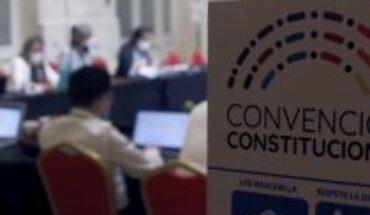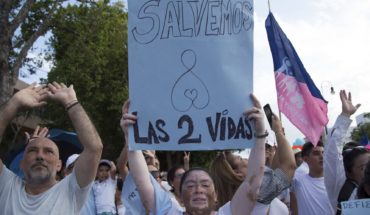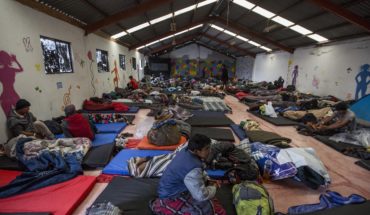“Traitors,” was what some conventionals shouted at their peers on April 21. This, after the second report presented by the Committee on the Environment and Economic Model before the Plenary was generally rejected, that is, the total of conventional ones. A reading followed – at a press point, by the conventional Constanza San Juan (independent and close to Pueblo Constituyente) – of the names of 11 of the 46 constituents who had voted against the report: 10 from the Socialist Collective and Renato Garín (Ind.).
The rejections of the document – which contained 52 articles and covered matters such as constitutional status of waters, food sovereignty, status of minerals, economic system, and ecological and social function of property – came from the center-right and the Socialist Collective. Members of the Colectivo del Apruebo abstained, in addition to Félix Galleguillos (Reserved Seats, representative of the Atacameño people), a member of the commission.
After the break in the center-left within the Environment, talks were restarted with the representation of the conventional socialist Pedro Muñoz, who arrived accompanied by Sebastián Salazar, in order to establish, in parallel, the technical talks with the other advisors of the commission. Almost at 1 a.m. on Thursday, the meeting between the representatives of the center-left collectives ended, who were talking inside room 4, in what was the second consecutive day of meetings.
“We have agreed on a series of meetings to be able to define the replacement report between now and Saturday,” said carolina Vilches, a convention member of The Constituent Social Movements (MSC), part of Modatima.
“After the rejection and all the impacts it has had both on trust and on the need to build dialogue, we are working for a new replacement report together with the Socialist Collective, the Broad Front, INN, to achieve the agreement that Chile expects regarding the water statute, the status of natural commons, economic principles and also mining, to meet 2/3 and the urgent needs of people suffering from the impacts of water,” he added.
Talks with socialists within the Environment
Around two and a half hours lasted the first extra-programmatic meeting of the center-left plus Reserved Seats, as well as collectives of independents and social movements within the Environment Committee, since its second report was rejected last week.
It was on Wednesday 27 and they met at 7:00 p.m., just after a day of voting in the Chamber. Those in attendance described one of the goals as “rebuilding an atmosphere of dialogue.”
After the meeting, they assured that there were recriminations to the biology professor and part of the Socialist Collective in the commission, María Trinidad Castillo, for “missing her word” regarding the agreement they had reached – articles together – within the commission with Chile Digno (PC, FRVS and independents), Constituent Social Movements, Constituent People, Reserved Seats, Independent by a New Constitution or INN, in addition to the Plurinational Coordinator.
According to conventions of the Plurinational Coordinator and Constituent Social Movements, these same collectives raised as a demand to resume talks that the Socialist Collective propose “a militant and new voice”, since they assure that the expanded meetings prior to the rejected report had been attended by other socialist representatives, such as Andrés Cruz and Tomás Laibe.
The Socialist Collective appointed Pedro Muñoz – a conventional who only on Monday concluded his role in the negotiations on the Legislative System, which led to an agreement on the part of the center-left inside the space – to lead the negotiations with the constituents of the Environment Commission.
This designation was not only a response to the request of the collectives within the Environment. María Trinidad Castillo, the conventional independent and part of the socialist group within the commission, after the general rejection of the second document presented to the plenary instance, warned the collective – according to members – that it needed support for political negotiations.
Not only pedro muñoz and Trinidad Castillo of the Socialist Collective attended, but alson did Tomás Laibe – of the Justice Systems Commission. On behalf of INN, Carolina Sepúlveda and Juan José Martin, coordinator of the commission, participated. For Constituent Social Movements attended Camila Zárate -who is also coordinator of the space-, Carolina Vilches and Gloria Alvarado. Ivanna Olivares and Isabel Godoy (representative of the Colla people) arrived from the Plurinational Coordinator. From Chile Digno was Bessy Gallardo, and on behalf of Reserved Seats was Félix Galleguillos, accompanied by Luis Jiménez –from Sistemas de Justicia–.
According to those who were present, the articles were reviewed one by one and the objections that each group had, especially the Socialist Collective and INN – which work together in the commission – were addressed. For this first meeting they managed to see the water issues, and an order was proposed to review the sections and foresee in which topics they could reach a consensus to present this Saturday joint indications and in which not, to present others separately.
First water, then statutes in general, environmental human rights, economic principles and, finally, mining. The decision was also taken that the meetings should only be attended by conventions and “political issues” would be seen, so that during the following day, and based on the guidelines left by the constituents, the advisers would meet to study the issues of a more technical nature.
From Constituent Social Movements they assure that after the rejection they are looking to improve the report and the idea of “we are going to listen because they (the Socialist Collective and INN) have already seen our letters” was transmitted.
During the day the advisors met – as reported by the conventional constituents – and these conversations were joined by the advisor of the Socialist Collective, the lawyer Sebastián Salazar, with a master’s degree in Public Law from the Carlos III University of Madrid and a doctorate in Law and Political Science from the University of Barcelona. The Socialists explained that they added it to the talks as a technical reinforcement because of the weight that this report has, given that it establishes the economic system.
Thursday’s meeting lasted until almost 01:00 a.m. and took place inside the former Congress, in room 4, located on the first floor. During the aforementioned second meeting, according to the members of the Environment belonging to the center-left, the advisors presented their proposals around what was discussed on Wednesday about water.
The main knots
Within the Socialist Collective they say that they seek to improve the wording, but also the technical in regard to the articles on the economic system, a topic that they have not yet addressed in the negotiations.
Socialists also point out that their objective is to synthesize and recast those norms that are repetitive. An example was what was raised on Wednesday by this group about joining articles 1 and 2, which establishes that water is a human right and the duty of the State to protect it.
At the first meeting there was consensus on the articles establishing a system of water governance: basin councils.
Indigenous peoples’ rights to water in their territories
The reason why the conventional of Reserved Seats, Félix Galleguillos, abstained in the general vote on the second report on April 21, was – according to members of the same group – the calculation that Article 7 on indigenous right to water in their territories was not going to reach 2/3. In this regard, they maintain that there was a lack of time for dialogue.
“We will be able to have natural commons that are inappropriable, and appropriable, by the way. The water subject to authorizations of temporary use with grounds of expiration, extinction and revocation, well, excellent (he said while raising his right fist). But if there is no special protection for indigenous peoples in terms of water as presented in article 7, only the current logic of dispossession of indigenous peoples will continue to be perpetuated. And for that I am not available,” Galleguillos said that day.
The section stated that the Constitution “recognizes indigenous peoples and nations the rights to the waters existing in their lands and territories, which shall be administered directly by them, in accordance with their own right and the right to self-determination” (excerpt).
According to conventions within the commission, this wording generated certain objections on the part of INN and the Socialist Collective. With the aim of articulating, they explain in Reserved Seats, Luis Jiménez – of Justice Systems and who had previously participated in negotiations within the Environment Committee – has joined as support for Galleguillos. This, they need within their collective, for their legal experience and their knowledge on the subjects of water to belong to the Aymara people.
However, at the end of the meeting on Thursday, almost at 01:00 a.m., the attendees assured that a first agreement was reached with INN and the Socialist Collective on this rule. Socialist sources indicate that the continuity of the support of this section will depend on the conversations that are coming about the economic system and the role that will drive the State to take in it.
“Since 1990 it has been a historical constant in our laws that particular protection is given to the waters of indigenous peoples. What does this mean? Is it a privilege? No. What guarantees this ancestral right is that we materially occupy the waters that are in our communities for human consumption, for grazing areas, for agriculture. And that we do not need the Water Code to grant us this registered right to exercise it. (…) Article 7 does not come to cause a great paradigm shift, therefore, I would be surprised if the collectives that call themselves progressive reject this seventh article,” said Luis Jiménez in defense of Article 7, on April 21.
Within Reserved Seats, they affirm that “the inappropriability of water”, which they propose as a commission, generated a complication around the right of indigenous peoples to water in their territories and that, in this way, there would be a “cross between indigenous property and the inappropriability of water”.
Eight articles emerged from the Mining Statute, administrative title or concessions, of the chapter “Constitutional Statute of Minerals”, which is part of the document presented to the Plenary on April 21 – and which is being used as a basis on which to talk during the negotiations of the center-left – eight articles emerged. Article 27 established that “mining authorizations shall be granted temporarily, through a transparent procedure and informed to the public, under the terms and conditions established by law. These authorizations do not grant ownership.”
According to the members of the commission, this is one of the discussions that are not yet touched in the meetings, although it is in the corridors, which has made two positions transparent. In this sense, there would be a group that agrees that what is related to the authorizations for mining activity are administrative titles – delivered by the State – without the possibility of having private property over the territories, while others promote the idea that they are consigned as concessions.
The same article (cited 27) proposed that “substances such as lithium, non-metallic minerals, liquid, solid or gaseous hydrocarbons, those substances located in areas that the Constitution and the law consider of national interest, and other substances determined by law shall not be subject to administrative authorizations. These substances will be exploited by state enterprises.”
This was criticized by Marcos Barraza (PC) on the day the report was presented to the Plenary. In addition to saying that it was “weak”, he said that, if fundamental rights were to be financed, “we require fiscal sustainability, and this forces us to renationalize copper and other minerals”, a matter that he accused was missing from the document.
Representatives of Chile Digno in the negotiations also said that they are promoting measures that leave the door open to the nationalization of lithium and copper.
From the Socialist Collective they assured that they put especially in charge of this annex the advisor Sebastián Salazar. Sources within the socialist group described that, from their point of view, the country still lacks the tools to expropriate, that they will promote giving more space to the private world in mining articles and that they would be open to the fact that there is no property right over authorizations.
This is not the first misstep of the Committee on the Environment
The first report of this committee was voted on in general on 3 March and 6 out of 40 articles were adopted (of which, in the vote in particular, only the second paragraph of Rule 1 was adopted).
On 21 April, when the vote was taken on the second document presented by the Committee on the Environment, the criticisms heard in the corridors were similar: “Many things can be regulated by law” and “deficiencies in its wording”.
After the cries of betrayal and the reading in front of the cameras of the names of those who rejected in general the second report, Tomás Laibe (Socialist Collective) stressed: “We will not accept that this is the form of deliberation in this Convention. In a democracy, differences of opinion are resolved with arguments and ideas, not with threats or thuggery.”
Within the Socialist Collective they assure that the reason for the rejection was that their conventional María Trinidad Castillo, although she approved the report in general, transmitted to the members of the space that was a set of articles that needed to be refined and that the proposal was not yet solid both in economic and mining terms.
Operation rescue: dialogue with the center-left resumes at the last opportunity of the Environment Commission
April 29, 2022 |





